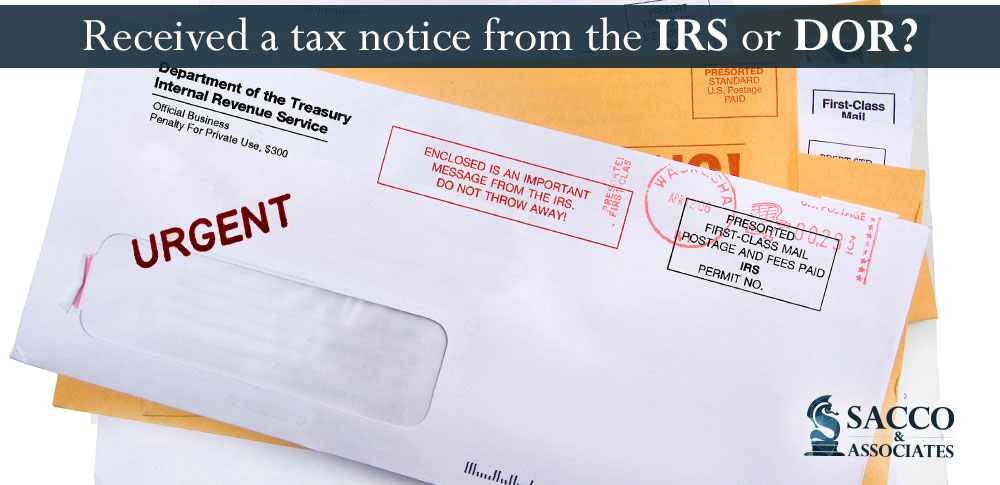Note: The IRS and DOR send tax Notices by mail only through the U.S. Postal Service. The taxing authorities never contact taxpayers via telephone, email, text message, or social media to ask for personal or financial information. If you receive an IRS or DOR solicitation in any format other than a letter sent through the mail, it may be an attempt to steal your personal or financial information. If you receive an email, forward the email (as is) to phishing@irs.gov then delete the email. If you receive a telephone call, record the person’s name, badge number, call back number, and caller id. Then call 1-800-366-4484 to determine if the caller is an IRS employee with a legitimate need to contact you. If not, forward the information to phising@irs.gov. Be diligent………………
For nearly everyone, seeing an envelope from the IRS or DOR in your mail can cause a brief moment of panic. You may be afraid to look at the envelope, let alone open it. Perhaps you’re even tempted to postpone dealing with it and throw it in the pile of mail that you’ll get to later. You may even be so overwhelmed with nervousness that you write out a check and mail it without even investigating why you received the Notice in the first place. So, what should you do when you get a Notice from the IRS or DOR?
1. Take a deep breath, relax and above all don’t panic.
Combined, the IRS and DOR send out millions of letters and Notices to taxpayers annually. They cover a broad range of subjects from errors on your tax return, to verification of your identity, or reminders that you may be eligible for certain credits like the Earned Income Tax Credit. In general, the Notice usually covers a specific issue about your account or tax return. It may request payment of taxes, notify you of a change to your account, or ask for additional information.
2. Do NOT ignore the notice.
Ignoring an IRS/DOR notice or letter will not make it go away. Generally, if you receive a notice that you owe additional taxes, the IRS/DOR will perceive a failure to respond as admission of underpayment and start the collections process. Likewise, it’s important to determine if a time frame to respond is given. Many IRS notices and letters require a 10-day or 30-day response window for example. If you don’t agree with the notice, you still need to respond typically within 30 days. Ignoring a notice from the IRS/DOR for even a week will cause you and your accountant to lose valuable time.
3. Read the Notice
As stated above, not every envelope from the IRS/DOR is a bill or even bad news. But you won’t know until you open it. If you receive a Notice about a correction to your tax return, you should review it carefully. Many times, these notices are partially or totally incorrect; you should always verify all the information in the letter against your tax records. If you agree with the correction, you usually don’t need to reply unless a payment is due. If you don’t agree with the correction the IRS or DOR has made, it is extremely important that you respond as requested. Respond in writing to explain why you disagree. Submit and included any documents you wish the IRS or DOR to consider. Mail your information to the address shown on the Notice. Allow a minimum of 30 days for a response.
If you are confused as to what they are asking for, you can always check the IRS/DOR website for more information on your Notice or letter number (i.e. CP501, L1058). The Notice or letter number can usually be found in the upper right-hand corner of each page. For example, you can search at these two sites for more information on your specific notice:
- IRS: https://www.irs.gov/individuals/understanding-your-irs-notice-or-letter
- Massachusetts DOR: https://www.mass.gov/service-details/learn-about-types-of-dor-bills-and-notices
There is no need for you to call or visit an IRS or DOR office to answer most Notices. If you do have further questions, call the telephone number in the upper right corner of the Notice. When you call, expect to be placed on “hold” for a period. Be patient, after all this is your Government hard at work. When you do finally get to speak to someone, have a copy of your tax return and the Notice available.
4. Keep Copies of All Responses
Each letter or Notice will offer specific instructions on what you need to do to satisfy the inquiry. Again, it’s important to remember that you will be given a time frame for response and you don’t want to be late. Follow instructions and respond in a timely manner. Where proof will be helpful, attach it (but do not send your only copy). Keep a copy of everything.
And lastly, pay close attention to the proper mailing address for your response and deadline. The IRS and the DOR have multiple offices and use multiple mailing addresses. Sending your response to the wrong address will result in a delay to your resolution.
Conclusion
If you can overcome that initial moment of fear when you receive a Notice, you can immediately begin to assess the situation and plan your response. Because many Notices from the IRS and DOR will have a response deadline, it’s important to quickly determine if you need the assistance of a professional tax CPA. Should the situation require the expertise of a professional, contact us as soon as possible and we will remove your fear, ease your burden, and prepare the necessary response to resolve your situation as favorably as possible.

